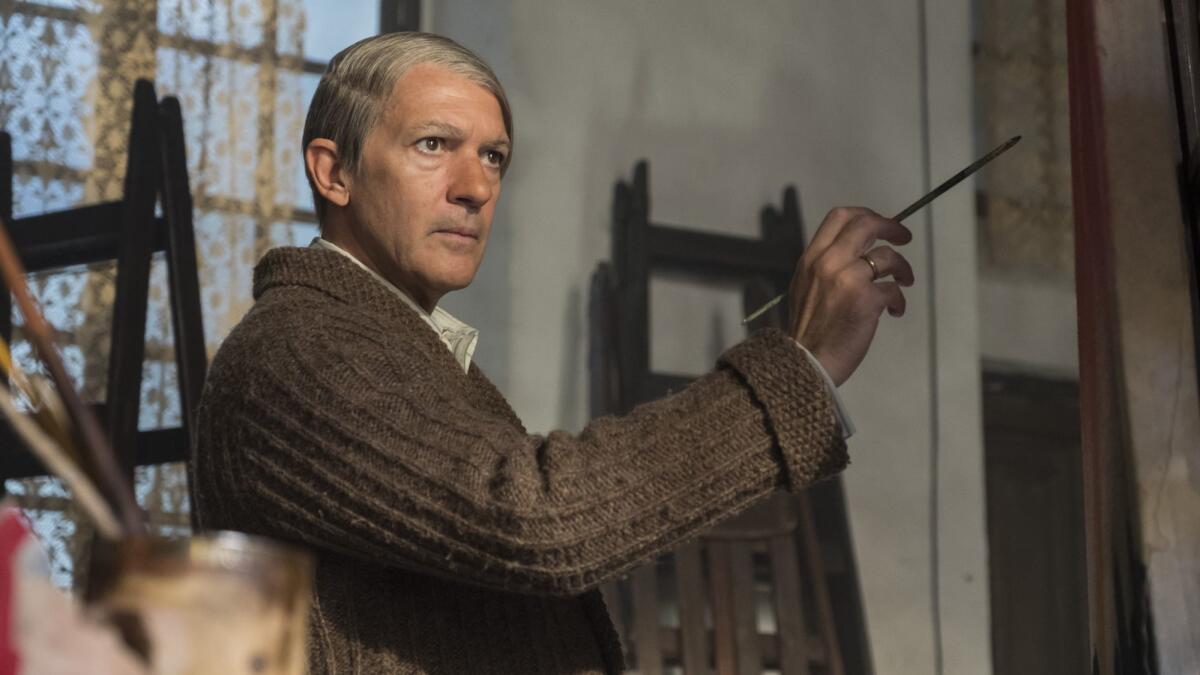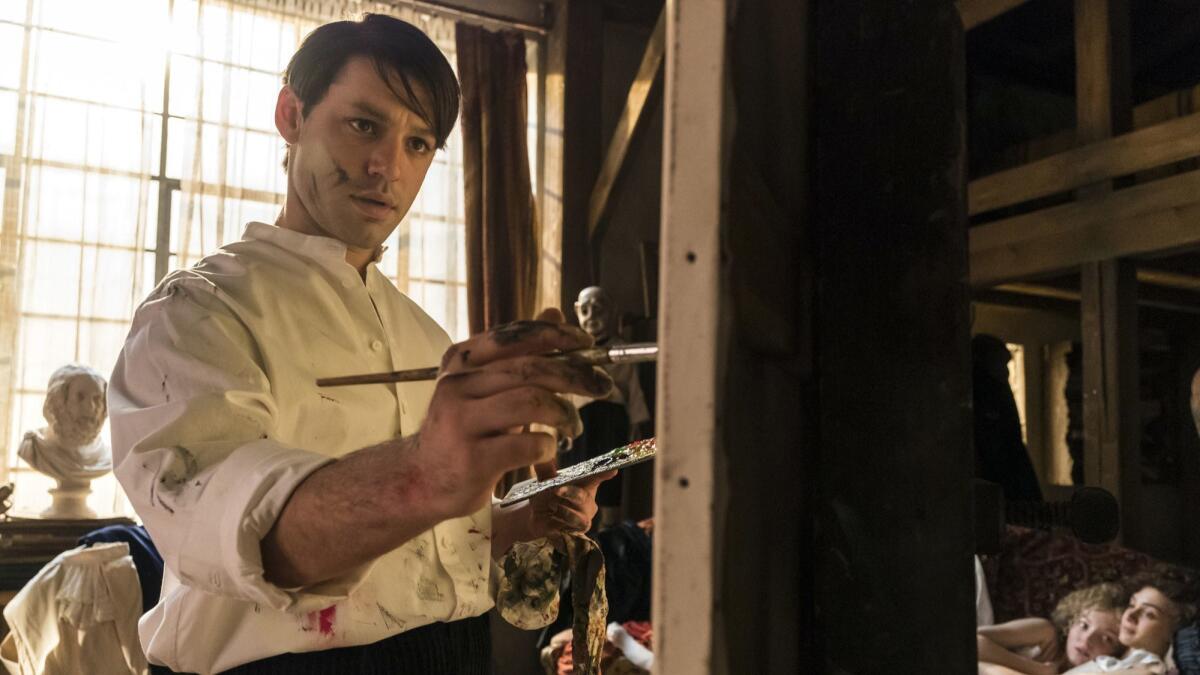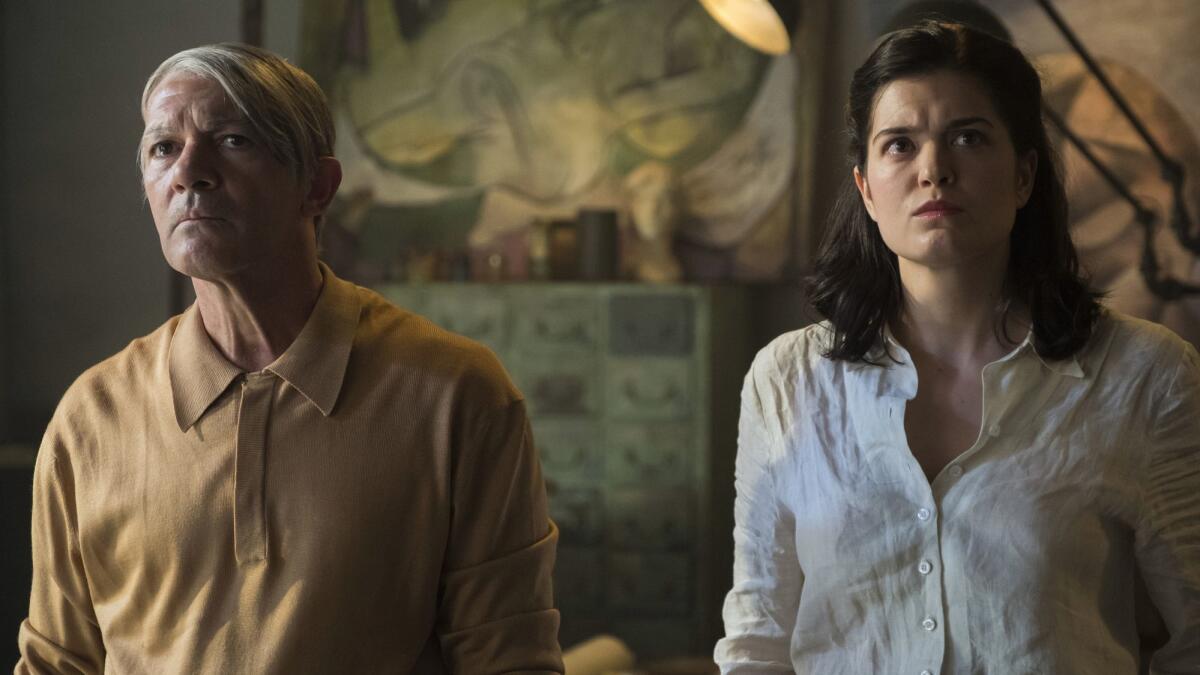Review: The artist, evolving and then fully formed in Nat Geo’s ‘Genius: Picasso,’ starring Antonio Banderas

- Share via
For the second season of their National Geographic Channel anthology series “Genius,” showrunner Ken Biller and producers Ron Howard and Brian Grazer turn their attention from Albert Einstein to Pablo Picasso. It’s a fairly diverting if not really a convincing piece, slight and sometimes silly but with a nice central performance by Antonio Banderas as Older Pablo, and a decent sampling of Picasso’s art dressing up the place.
This is really Howard and Grazer’s third “genius” project, after the 2001 Howard-directed, Oscar-winning “A Beautiful Mind,” about the mathematician John Nash, a film that benefited from its subject’s relative obscurity. As with the Einstein series, the point is to show you the Famous Genius You Never Knew, unless you have paid any attention to the numerous books and documentaries on Picasso’s art and life from which the miniseries adapts its story and takes its details.
The series sets off on alternating tracks, one beginning in 1881, the year of Picasso’s birth, and the other in 1937, when he painted his huge, great monochrome antiwar statement “Guernica” for the Spanish Pavilion of the Paris World’s Fair. There is plenty of personal drama, as young Picasso (Alex Rich) discovers his gifts, rejects the authority of his instructors (“You only teach rules and imitation. I want to do something original! Unique!”) and heads off to Paris, where Pablo falls in with the avant-garde and falls in love with mistress No. 1, Fernande Olivier (Aisling Franciosi).

Middle-aged Picasso, meanwhile, moves on, in an overlapping fashion, from mistresses Dora Maar (Samantha Colley) and Marie-Thérèse Walter (Poppy Delevingne) to new love Françoise Gilot (Clémence Poésy). The series tries to give the women agency — Maar in this telling practically goads Picasso into painting “Guernica” — and as if in public compensation for two series focusing on sometimes difficult men and the women who loved them, the subject of the third season of “Genius” has already been announced to be Mary Shelley.
The dual timeline, while it keeps Banderas busy from the top of the series, fractures the narrative a little, so that other characters seem more weightless than they otherwise might have. Max Jacob (T.R. Knight) and Guillaume Apollinaire (Seth Gabel), whose own reputations do not rest entirely upon their having known Picasso, both come off as unduly pathetic, the former sporting an unrequited passion for Pablo (Max: “I love you.” Pablo: “Not the way you want me to”), the latter saddled with a mother who slaps his face for staying out late.
It is a long series — 10 episodes — of which only four were available for review, so these are provisional judgments. As art history, “Genius: Picasso” is so far only sketchily enlightening, unless you count “An artist must always see below the surface” as a revelation. But there is much yet to come: Picasso’s Iberian period, his African period, the radical inventions of “Les Demoiselles d’Avignon,” the creation of Cubism with Georges Braques. Gertrude Stein, his great subject and pal, has yet to appear. The early track will eventually, I assume, arrive at the later track, filling in the blanks.

Banderas, who looks uncannily correct around the eyes — and Picasso, iconographically, is mostly eyes and a haircut — is relaxed good company. He is also a Spaniard playing a Spaniard — indeed, he hails from Picasso’s hometown of Málaga — among a cast of actors who sometimes sport less than identifiable accents.
A lot has been written about Picasso over the many decades of his life and afterward, and every new biography is controversial in turn, either for tearing down the legend or building up the creep. As young Pablo, Rich is all immature tortured enthusiasm; as the technically more mature Picasso, Banderas tries to steer a middle path, amused and bemused, showing the artist in different lights, some flattering, some less so, but never as bad as some other characters make him out to be.
There are some enjoyable passages and good performances in addition to Banderas’, but overall the series — so far as I have seen it — is prey to the usual compressions and exaggerations of the bio-pictorial form. There is the usual emphasis on key moments and conflicts, giving the piece, even at its extended length, the flavor more of a pageant than a story of evolving real people. There is the usual excess of expository dialogue, framing quotes from the historical record: (“Give me a museum and I’ll fill it” and in reply to a German officer asking Picasso “Did you do this?” in reference to a photograph of “Guernica,” “No, you did.”)
“Genius” is a big, if short, word, and there are those who would seek to deny Picasso the title, just as there are those who claim that the Beatles were no good. Still, if you’re at all interested in the history of art, he is someone you have to reckon with — not to spoil the ending, but he lived to 91 and was still painting the day he died — even if it’s only to decide he’s not your thing. If “Genius” only gets you interested in learning a little more about the art behind the biopic, it will have done its job. The rest, more or less, is entertainment.
‘Genius’
Where: National Geographic Channel
When: 9 and 10 p.m. Tuesday
Rated: TV-14-DLSV (may be unsuitable for children under the age of 14 with advisories for suggestive dialogue, coarse language, sexual content and violence)
ALSO
Antonio Banderas shows his artistic side in Nat Geo’s ‘Genius: Picasso’
LACMA’s uneven new Picasso and Rivera show reveals an unprecedented, must-see discovery
Nat Geo says ‘Frankenstein’ author Mary Shelley is its next ‘Genius’
Follow Robert Lloyd on Twitter @LATimesTVLloyd
The complete guide to home viewing
Get Screen Gab for everything about the TV shows and streaming movies everyone’s talking about.
You may occasionally receive promotional content from the Los Angeles Times.




